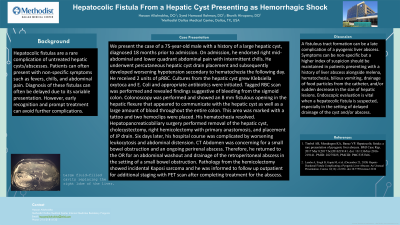Tuesday Poster Session
Category: Liver
P3981 - Hepatocolic Fistula From a Hepatic Cyst Presenting as Hemorrhagic Shock
Tuesday, October 24, 2023
10:30 AM - 4:00 PM PT
Location: Exhibit Hall

Has Audio
- HA
Hassan Allahrakha, DO
Methodist Dallas Medical Center
Dallas, TX
Presenting Author(s)
Hassan Allahrakha, DO, Syed Hamaad Rahman, DO
Methodist Dallas Medical Center, Dallas, TX
Introduction: Hepatocolic fistulas are a rare complication of untreated hepatic cysts/abscesses. Patients can often present with non-specific symptoms such as fevers, chills, and abdominal pain. Diagnosis of these fistulas can often be delayed due to its variable presentation. However, early recognition and prompt treatment can avoid further complications.
Case Description/Methods: We present the case of a 75-year-old male with a history of a large hepatic cyst, diagnosed 18 months prior to admission. On admission, he endorsed right mid-abdominal and lower quadrant abdominal pain with intermittent chills. He underwent percutaneous hepatic cyst drain placement and subsequently developed worsening hypotension secondary to hematochezia the following day. Cultures from the hepatic cyst grew Klebsiella oxytoca and E. Coli and appropriate antibiotics were initiated. He also received 2 units of pRBC. Tagged RBC scan was performed and revealed findings suggestive of bleeding from the sigmoid colon. Colonoscopy was performed and showed an 8 mm fistulous opening in the hepatic flexure that appeared to communicate with the hepatic cyst as well as a large amount of blood throughout the entire colon. This area was marked with a tattoo and two hemoclips were placed. His hematochezia resolved. Hepatopancreaticobiliary surgery performed removal of the hepatic cyst, cholecystectomy, right hemicolectomy with primary anastomosis, and placement of JP drain. Six days later, his hospital course was complicated by worsening leukocytosis and abdominal distension. CT Abdomen was concerning for a small bowel obstruction and an ongoing perirenal abscess. Therefore, he returned to the OR for an abdominal washout and drainage of the retroperitoneal abscess in the setting of a small bowel obstruction. Pathology from the hemicolectomy showed incidental Kaposi sarcoma and he was informed to follow up outpatient for additional staging with PET scan after completing treatment for the abscess.
Discussion: A fistulous tract formation can be a late complication of a pyogenic liver abscess. Symptoms can be non-specific but a higher index of suspicion should be maintained in patients presenting with a history of liver abscess alongside melena, hematochezia, bilious vomiting, drainage of food particles from the catheter, and/or sudden decrease in the size of hepatic lesions. Endoscopic evaluation is vital when a hepatocolic fistula is suspected, especially in the setting of delayed drainage of the cyst and/or abscess.
Disclosures:
Hassan Allahrakha, DO, Syed Hamaad Rahman, DO. P3981 - Hepatocolic Fistula From a Hepatic Cyst Presenting as Hemorrhagic Shock, ACG 2023 Annual Scientific Meeting Abstracts. Vancouver, BC, Canada: American College of Gastroenterology.
Methodist Dallas Medical Center, Dallas, TX
Introduction: Hepatocolic fistulas are a rare complication of untreated hepatic cysts/abscesses. Patients can often present with non-specific symptoms such as fevers, chills, and abdominal pain. Diagnosis of these fistulas can often be delayed due to its variable presentation. However, early recognition and prompt treatment can avoid further complications.
Case Description/Methods: We present the case of a 75-year-old male with a history of a large hepatic cyst, diagnosed 18 months prior to admission. On admission, he endorsed right mid-abdominal and lower quadrant abdominal pain with intermittent chills. He underwent percutaneous hepatic cyst drain placement and subsequently developed worsening hypotension secondary to hematochezia the following day. Cultures from the hepatic cyst grew Klebsiella oxytoca and E. Coli and appropriate antibiotics were initiated. He also received 2 units of pRBC. Tagged RBC scan was performed and revealed findings suggestive of bleeding from the sigmoid colon. Colonoscopy was performed and showed an 8 mm fistulous opening in the hepatic flexure that appeared to communicate with the hepatic cyst as well as a large amount of blood throughout the entire colon. This area was marked with a tattoo and two hemoclips were placed. His hematochezia resolved. Hepatopancreaticobiliary surgery performed removal of the hepatic cyst, cholecystectomy, right hemicolectomy with primary anastomosis, and placement of JP drain. Six days later, his hospital course was complicated by worsening leukocytosis and abdominal distension. CT Abdomen was concerning for a small bowel obstruction and an ongoing perirenal abscess. Therefore, he returned to the OR for an abdominal washout and drainage of the retroperitoneal abscess in the setting of a small bowel obstruction. Pathology from the hemicolectomy showed incidental Kaposi sarcoma and he was informed to follow up outpatient for additional staging with PET scan after completing treatment for the abscess.
Discussion: A fistulous tract formation can be a late complication of a pyogenic liver abscess. Symptoms can be non-specific but a higher index of suspicion should be maintained in patients presenting with a history of liver abscess alongside melena, hematochezia, bilious vomiting, drainage of food particles from the catheter, and/or sudden decrease in the size of hepatic lesions. Endoscopic evaluation is vital when a hepatocolic fistula is suspected, especially in the setting of delayed drainage of the cyst and/or abscess.
Disclosures:
Hassan Allahrakha indicated no relevant financial relationships.
Syed Hamaad Rahman indicated no relevant financial relationships.
Hassan Allahrakha, DO, Syed Hamaad Rahman, DO. P3981 - Hepatocolic Fistula From a Hepatic Cyst Presenting as Hemorrhagic Shock, ACG 2023 Annual Scientific Meeting Abstracts. Vancouver, BC, Canada: American College of Gastroenterology.
